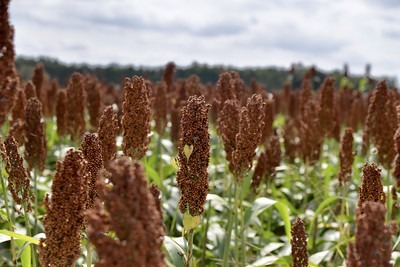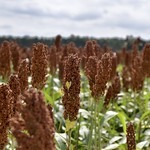
GM/Biotech Crops Report – March 2023
8th March 2023- GM/Biotech Crops Monthly Reports (BELOW) form part of BCPC’s free three-tier Biotech Crops Info service.
- This service also includes a weekly round-up of news from around the globe – see BCPC Newslink GM Crops section.
- Plus – Free access database on over 300 GM/biotech products covering 23 crops in the global market visit BCPC’s GM/Biotech Crops Manual – Register here for free access.
- Already registered? Click here
GM/Biotech Crops Monthly Report March 2023
Improved sorghum

When anthracnose attacks sorghum it can result in a yield reduction of 50% but now scientists at US Department of Ag Research Service have identified a gene that can strengthen the plant’s natural resistance and perhaps reduce its reliance on applied fungicides.
Pic: Michele Dorsey Walfred
Gene-edited wheat
Rothamsted has completed field trials on a gene-edited wheat that confirms the fact that the gene-edited variety has 50% less asparagine than the control variety Cadenza. The asparagine converts to acrylamide when cooked which is known to be a potential carcinogen.
Mosquito control
Mosquitos can claim to be the most dangerous animal in the world because the diseases they transmit affect around 350 million people annually and kill perhaps 450,000 each year. Now researchers at Toronto University have developed a CRISPR toolkit that they can use to investigate how viruses replicate inside the mosquito and, by blocking certain proteins, reduce the viral load without killing the mosquitos.
Mending a broken heart
Cardiovascular disease accounts for 32% of all deaths globally but now researchers at the University of Texas have developed a CRISPR-Cas9 editing therapy that can repair the damaged heart tissue in mice. The next step is to test it in other animals and eventually in humans.
Gene drives in agriculture
Crops are beset by attack from pests, weeds and diseases but could we stem the flow of these yield robbers? People are now considering using gene drives to reduce the competitive ability of these pests and diseases but will there be unintended side effects? A fact sheet has been published.
AI-guided weed control
Spraying weeds just got more technical as John Deere unveils a sprayer equipped with 36 cameras that differentiate between crop and weed and the ai backing up the system only sprays herbicide on the weeds, reducing overall applications. Also in the news is a laser system that zaps the weeds in potatoes and onion crops, burning the weeds rather than killing them with herbicides.
Better fish
Talapia are the most frequently farmed fish around the world because they are nutritious and they grow quickly. Now a collaborative effort between the Rosalind and Earlham Institutes has allowed publication of the whole Talapia genome to accelerate improvement of the already elite varieties that are currently grown.
3-D soybean genome
A sequence of letters is one thing but the Chinese Academy of Science has now published a 3-D model of the genome of soybean which should help researchers identify more on how gene regulation occurs in the molecule.
Pesticide reduction
Europe has proposed a blanket 50% reduction in pesticide use but now there are reports that Brussels is considering reducing this further to just 20% of current usage. Whilst it is not immediately applicable to the UK, perhaps the ai-controlled spraying technology mentioned above could help meet these proposals without significant loss of yields.
Anti-cancer drugs
A plant called skullcap (Scutellaria barbata) has long featured in Chinese traditional medicine and more recently it has been the source of scutebarbatine A, a drug that seems to have activity against some cancers. Now an international team led by John Innes and The Chinese Academy of Science has sequenced the genome of this plant to elucidate how it constructs the useful drug.
Strawberries for all
Strawberries are popular world-wide but grow best in temperate climates. To reduce the cost of transport a company in Singapore has developed a variety of strawberry that can cope with growing in hotter climates and can therefore be grown more locally. I just hope that it tastes as good.
Cassava bacterial blight control
Researchers in Los Angeles and Hawaii have developed a new epigenetic editing technique to improve the resistance of Cassava to bacterial blight, a devastating disease that causes dramatic yield reductions in Cassava world–wide.
THE LATEST ADDITIONS TO THE GM/BIOTECH DATABASE ARE:
The latest approvals of biotech crops to report this month:
• There are no additions to the biotech crops database this month.
FOR INSTANT ACCESS TO GM BIOTECH MANUAL CLICK HERE (Registration required)
Already Registered? Click here to access

